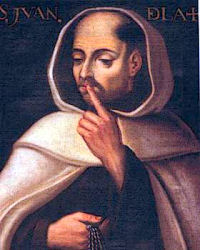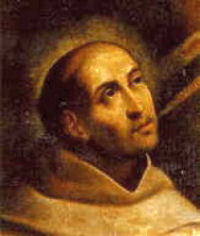Advent: December 14th
Memorial of St. John of the Cross, priest and doctor
» Enjoy our Liturgical Seasons series of e-books!
St. John of the Cross (1542-1591) was born and died in Spain. His parents were poor and could not give him training in any trade. Hence he became the servant of the sick in the hospital of Medina. In 1563 he offered himself as a lay brother to the Carmelite friars, who, however, perceiving his unusual talents, had him ordained a priest. When he was about to join the more severe Order of the Carthusians, the saintly Teresa persuaded him to remain and help her in the reform of the Carmelite Order. This reform of his order caused him such sufferings and brought him many trials. But his sufferings served only to detach him from creatures. He had a great devotion to Our Lord's Passion and voluntarily sought out humiliations. When Our Lord asked him what reward he would ask for his labors, John answered: "To suffer and to be despised for Thee." He died of a cruel disease, embracing the crucifix. Because of his profound treatises on mystical theology Pope Pius XI proclaimed him Doctor of the Church. According to the 1962 Missal of St. John XXIII the Extraordinary Form of the Roman Rite St. John of Cross' feast is celebrated on November 24.
St. John of the Cross Juan de Yepes was the Castilian son of a poor silk weaver of Fontiberos, Toledo, Spain and was born in 1542. His father was of noble birth; he had married much beneath him, and for that offense had been entirely cut off by his family. He had taken to silk weaving as a means of livelihood, but had never been able to make much of it. Soon after the birth of Juan he died, worn out with the effort to keep his wife and three children. The family was left in direst poverty; the children grew up always underfed, so that to the end of his life Juan remained dwarfed in stature.
Juan de Yepes was the Castilian son of a poor silk weaver of Fontiberos, Toledo, Spain and was born in 1542. His father was of noble birth; he had married much beneath him, and for that offense had been entirely cut off by his family. He had taken to silk weaving as a means of livelihood, but had never been able to make much of it. Soon after the birth of Juan he died, worn out with the effort to keep his wife and three children. The family was left in direst poverty; the children grew up always underfed, so that to the end of his life Juan remained dwarfed in stature.
Unable to learn a trade, he became the servant of the poor in the hospital of Medina, while still pursuing his sacred studies. In 1563, being then twenty-one, he humbly offered himself as a lay-brother to the Carmelite friars, who, however, knowing his talents, had him ordained priest. He would now have exchanged to the severe Carthusian Order, had not St. Teresa of Avila, with the instinct of a saint, persuaded him to remain and help her in the reform of his own Order.
Thus he became the first prior of the Discalced (meaning "barefoot") Carmelites. His reform, though approved by the general, was rejected by the elder friars, who condemned the saint as a fugitive and apostate, and cast him into prison, whence he only escaped, after nine months' suffering, at the risk of his life. Twice again, before his death, he was shamefully persecuted by his brethren, and publicly disgraced. But his complete abandonment by creatures only deepened his interior peace and devout longing for heaven.
St. John was a great contemplative and spiritual writer. He was proclaimed Doctor of the Church by Pope Pius XI on August 24, 1926. He is the patron of contemplative life, mystical theology, mystics, and Spanish poets.
Excerpted from Little Pictorial Lives of the Saints © 1878 and Saints for Sinners by Alban Goodier, S.J.
"With what procrastinations do you wait, since from this very moment you can love God in your heart?"
Excerpted from Prayer of a Soul Taken with Love — St. John of the Cross
Mine are the heavens and mine is the earth. Mine are the nations, the just are mine and mine the sinners. The angels are mine, and the Mother of God, and all things are mine; and God himself is mine and for me, because Christ is mine and all for me. What do you ask, then, and seek my soul? Yours is all of this, and all is for you. Do not engage your self in something less or pay heed to the crumbs that fall from your Father's table. Go forth and exult in your Glory! Hide yourself in it and rejoice, and you will obtain the supplications of your heart.
Excerpted from Sayings of Light and Love, 26-27 — St. John of the Cross
Patron: Contemplative life; contemplatives; mystical theology; mystics; Spanish poets
Things to Do:
- See Celebrating the Feast of St. John of the Cross for ideas.
- Read more about St. John of the Cross at the ICS website.
- Three of his works, Ascent of Mount Carmel, Dark Night of the Soul and Spiritual Canticle of the Soul and the Bridgegroom Christ are available online at the Christian Classics Ethereal Library.
